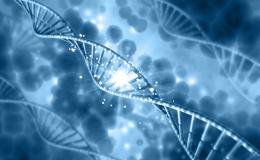Men’s Health Week: What Does a BRCA Gene Mutation Mean for Men?
June 17, 2021
The discovery of the BRCA genes, BRCA1 and BRCA2, and their association with hereditary breast cancer revolutionized the field of cancer biology and set the stage for future breakthroughs in cancer genetics.

Pathological mutations, or variants, in either of the BRCA genes can increase an affected woman’s risk of developing breast cancer 45-72% by 70 to 80 years of age.1 The increased cancer risks for women harboring BRCA variants are frequently publicized, but men can also inherit changes in BRCA genes, and the effects of these variants in men are not as well understood by the public. In recognition of Men’s Health Week from June 14 through June 20, 2021, we highlight how pathological BRCA variants can affect men and what steps can be taken to monitor for disease.
BRCA stands for “BReast CAncer gene,” and gene mutations in either BRCA1 or BRCA2 increase cancer risk. Both BRCA genes code for tumor suppressor proteins that help control cell replication. Cancer is a disease of uncontrolled cell division, and people that inherit pathological variants, or “misspellings,” of either BRCA variant produce altered gene products that function differently than the normal protein. These altered BRCA proteins are produced in virtually every cell of an affected person’s body from birth, compromising cell cycle control. Over time, other variants affecting cell cycle control can accumulate in cells until a cell becomes cancerous and divides uncontrollably.
BRCA variants cause Hereditary Breast and Ovarian Cancer syndrome (HBOC), a hereditary cancer syndrome that increases the risk of developing breast and ovarian cancers in women and breast and prostate cancers in men. Most BRCA gene mutations are inherited, and only one BRCA variant is necessary to increase cancer risk. Despite the emphasis of the effects of BRCA variants on women, men are equally likely to inherit and pass down pathological variants of the gene. Because only one copy of a BRCA variant is necessary to acquire HBOC, an affected parent has a 50% chance of passing down a harmful BRCA gene to their child. It is estimated that roughly one in 400 people harbor a harmful BRCA variant but can be as high as one in every 40 people with Ashkenazi/Eastern European Jewish ancestry.2 Some Scandinavian populations also have higher incidences of BRCA variants.2
Because gene variants are often inherited in hereditary cancer syndromes, patients harboring harmful gene mutations may have a family history of certain types of cancer, particularly on one side of the family. Individuals with HBOC, for example, may have a strong family history of breast, ovarian and/or prostate cancer on one side of their family. Hereditary cancers may also be diagnosed at earlier ages and/or produce rare cancers, such as breast cancer in men. Familial cancers are also more likely to recur after remission and occur in both organs, such as both breasts.
Breast cancer in men is unusual: only one in 1,000 men will ever develop the disease. Men with a BRCA mutation, however, have as high as a one in 20 chance of developing breast cancer.2 Because of this, men with BRCA variants should perform breast self-exams every day starting at age 35.2 Harmful BRCA variants also increase the risk of prostate cancer, and men harboring these mutations can monitor disease development with the prostate-specific antigen (PSA) blood test beginning at age 40.3
Genetic screening for BRCA variants isn’t currently recommended for the general population, but individuals, including men, with a family history of breast, ovarian, and/or prostate cancer should discuss their family history with their doctor, particularly if diagnoses were made at earlier ages and/or the cancer runs primarily on one side of the family. If a physician thinks genetic screening is warranted, at-risk individuals may be referred to a genetic counselor to guide them through the screening process. Additionally, people of Ashkenazi Jewish heritage may benefit from screening due to the high incidence of BRCA mutations in people with this ancestry. People with family members that have tested positive for BRCA variants should also be tested to rule out an increased risk of developing cancer.
Identification of a pathological BRCA gene mutation allows healthcare providers to tailor disease monitoring and risk mitigation for each patient based on the risks conferred by a specific gene variant. Importantly, early disease detection can significantly affect not only cancer prognosis, but future quality of life. Kailos Genetics developed the comprehensive ExpedioTM Hereditary Cancer Screening to detect variants in 33 genes associated with hereditary cancer syndromes, including BRCA1 and BRCA2. Kailos understands the importance of accurate, thorough genetic screening for patients, their families, and their peace of mind. Click here to learn more about ExpedioTM or contact us with any questions you may have regarding genetic screenings.




